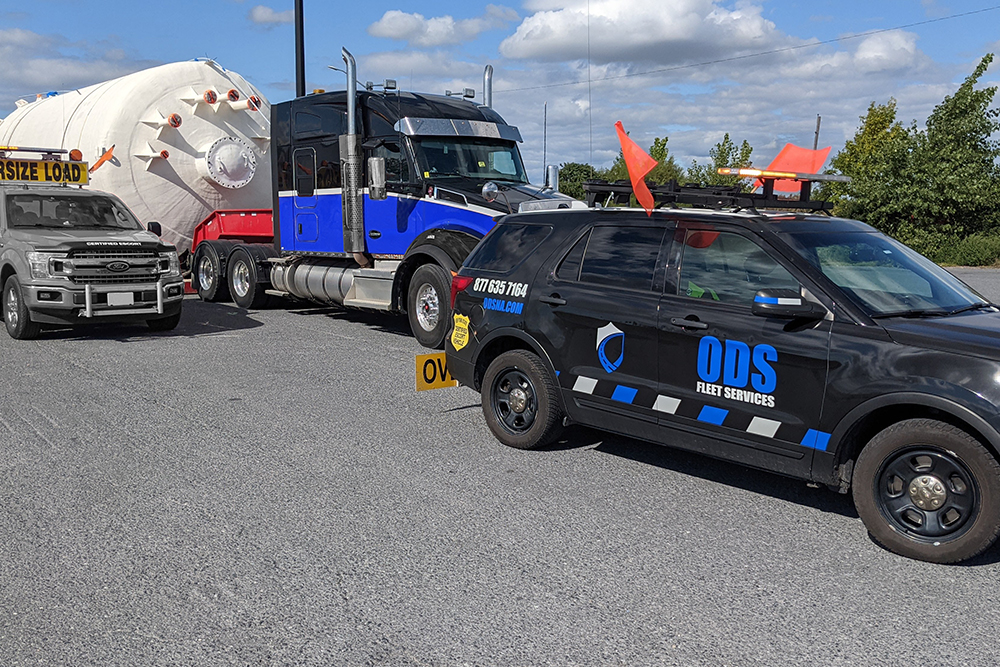In the United States and Canada, heavy haul transport plays a crucial role in moving oversized loads from one point to another. These loads, such as large construction equipment, wind turbine blades, or prefabricated homes, present unique challenges due to their size, weight, and dimensions. To ensure the safe and efficient transport of these oversized loads, the use of pilot cars, also known as escort vehicles, is essential.
Importance of Pilot Cars in Heavy Haul Transport
- Safety: The primary role of pilot cars is to enhance safety on the road during the transportation of oversized loads. These vehicles are equipped with special signage, flashing lights, and communication devices to alert other motorists about the presence of a large and slow-moving convoy. This early warning system helps prevent accidents and ensures the smooth flow of traffic.
- Traffic Control: Pilot cars assist in controlling traffic flow around the oversized load. They can block intersections, guide the truck driver during complex maneuvers such as turns or lane changes, and communicate with authorities to coordinate the safe passage of the heavy haul transport.
- Route Planning: Pilot car drivers are well-versed in local regulations and road conditions. Before the transport journey begins, they conduct route surveys to identify any potential obstacles such as low bridges, sharp turns, or construction zones. This proactive approach helps prevent delays and ensures that the oversized load reaches its destination without incident.
- Emergency Response: In the event of an emergency such as a mechanical breakdown or a traffic accident involving the oversized load, pilot car drivers are trained to respond quickly and effectively. They can provide support to the truck driver, assist in redirecting traffic, and communicate with emergency services to ensure a swift resolution to the situation.
Regulations Regarding Pilot Cars in North America
- Licensing: In both the United States and Canada, pilot car drivers are required to hold a valid driver’s license and undergo specialized training to handle escort vehicles. They must also adhere to specific regulations regarding equipment, signage, and communication devices while on duty.
- Insurance: To protect all parties involved in heavy haul transport, pilot car drivers are often required to carry liability insurance. This insurance coverage helps mitigate risks and provides financial protection in case of accidents or property damage during the transport of oversized loads.
- Communication: Effective communication between the pilot car driver, the truck driver, and any additional escort vehicles is crucial for the safe execution of heavy haul transport. Clear protocols and designated radio frequencies ensure that everyone is informed and working together to prevent accidents and delays.
- Compliance: Regulatory authorities closely monitor the operation of pilot cars in North America to ensure compliance with safety standards and traffic regulations. Violations such as improper signage, reckless driving, or failure to communicate effectively can result in penalties or fines for the driver and the trucking company.
The Future of Pilot Cars in Heavy Haul Transport
As the demand for oversized load transport continues to grow in North America, the role of pilot cars will become even more critical in ensuring safety on the road. Innovations in technology, such as GPS tracking, real-time traffic updates, and automated communication systems, will further enhance the efficiency and effectiveness of pilot car operations.
By investing in training programs, safety initiatives, and industry partnerships, the heavy haul transport sector can leverage the expertise of pilot cars to prevent accidents, reduce traffic congestion, and improve overall transportation logistics. With a focus on collaboration, compliance, and continuous improvement, pilot cars will remain indispensable in the safe and successful delivery of oversized loads across the United States and Canada.
Final Thoughts
Pilot cars play a vital role in preventing accidents and ensuring the safe transport of oversized loads during heavy haul operations in North America. By prioritizing safety, traffic control, route planning, and emergency response, pilot car drivers contribute to a more efficient and secure transportation process. As regulations evolve and technology advances, the future of pilot cars looks promising in supporting the growth of the heavy haul transport industry across the United States and Canada.

